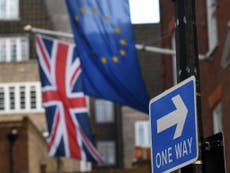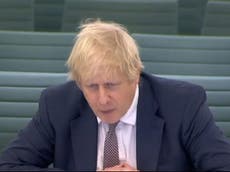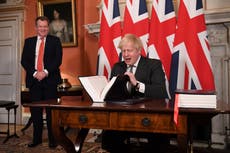Your support helps us to tell the story
From reproductive rights to climate change to Big Tech, The Independent is on the ground when the story is developing. Whether it's investigating the financials of Elon Musk's pro-Trump PAC or producing our latest documentary, 'The A Word', which shines a light on the American women fighting for reproductive rights, we know how important it is to parse out the facts from the messaging.
At such a critical moment in US history, we need reporters on the ground. Your donation allows us to keep sending journalists to speak to both sides of the story.
The Independent is trusted by Americans across the entire political spectrum. And unlike many other quality news outlets, we choose not to lock Americans out of our reporting and analysis with paywalls. We believe quality journalism should be available to everyone, paid for by those who can afford it.
Your support makes all the difference.Where is the data to show vulnerable people have not been forgotten during the rollout of the vaccine?
My mum-in-law is in my support bubble living a five-minute walk away. She is 91 coming on 92, severely visually impaired, and is a frail but an independent and sociable soul. She recently received a diagnosis – delayed for many pandemic months – of Alzheimer’s and has suffered very severe anxiety and distressing hallucinations that have now thankfully been a little tempered by long overdue medication.
She misses the young people in our extended family. She misses her lunch clubs and coffee mornings and her trips to the shops. She has seen hardly a soul for 10 months, except for myself and my partner, and the home care team who visit in the morning.
She has been sitting and watching briefings and news programmes for the last five weeks: showing her glimpses of horror, alongside happy-clappy snaps of people younger (and with louder voices than hers?), having their jabs and feeling great. She is anxious, frightened, and increasingly sad because she feels forgotten. Finally – and thankfully – her favourite carer will get a jab this week, providing a little more reassurance for us all.
We live in Sheffield. She has heard absolutely nothing about an appointment to receive a vaccination. We have made enquiries (of course! Even though specifically “instructed” not to do so). She will apparently be called when her time comes. We are ready to bring her at a moment’s notice to get her protected.
What is the selection strategy to prioritise the oldest people? Why is she still waiting when entire health care teams locally had their jabs weeks ago? Where is the local data to give us confidence she has not been forgotten?
She tells me that she doesn’t have any time left to begin her life again.
Like all of us she is a statistic to the government and the NHS, and she will presumably get her jab this month sometime – but every waiting day, and every session in front of the TV, brings new terrors for her. Surely this process could be better?
Name and address supplied
Legal ambiguity
What a great article on 12 January on why is it so difficult to challenge a Covid fine.
I have been saying for several months that the written and broadcast media have misled the public by talking about the Covid “rules”. There is no such thing as the rules, there is guidance and there is legislation and the two are completely separate.
For people like police officer Cressida Dick to be saying that the public is well aware of the “rules” and the police will now start fining people for flouting them is again misleading. It is indeed extremely disappointing if the police believe they can hand out penalty notices to people who they believe are breaching the guidance.
It's about time we stopped using the word “rules” and talked about either guidance or legislation – then the public generally may better understand what is lawful and what is not.
If the government wish to make something unlawful then it should do so by means of statute.
Rob Scott
Sheffield
Soap opera politics
I read John Rentoul’s column (The greased piglet manages to elude hunters at PMQs, 14 January) – I don’t know about anybody else but I am pig sick of this weekly soap opera, when Boris Johnson and Sir Keir Starmer take chunks out of each other and all the viewer at home gets is a recurring headache and no real answers.
Of course we know that the Labour leader is the “grown up” in the room and adheres faithfully to his forensic and interrogative line of questioning but he has no real hope, because the prime minister manages to twist, divert and generally shout his way out of trouble.
I am so fed up with this weekly display because I religiously tune in, hoping to see a reasoned, polite exchange of views, if not civilities.
In the worst crisis since the Second World War, the public is subjected to this irritable performance of batting insults back and forth. Why can’t there be more unity between the two main parties and get the job done, professionally, politely and persuasively? Then we the people can have faith that our elected members are united in fighting this insidious enemy, which has no political persuasion whatsoever and is probably relishing the abject sidelining of this ghastly public health emergency, over who can come out on top of a weekly Whitehall farce.
Judith A Daniels
Norfolk
Upholding justice
In the US, there aren’t many crimes worse than attempting to overturn the result of a presidential election with a violent coup. Your editorial (Impeaching Donald Trump a second time is unnecessary and risks further dividing the US) gets the issue totally wrong.
Whatever the consequences (yes, whatever), Trump’s actions on the Capitol had to be subject to the law, otherwise, the disparity between how the powerful and ordinary citizens are treated would have created contempt for justice in the US. Not that it’s particularly revered even now. It would have been a case of expediency triumphing over rule of law.
Justice must be seen to be just, and carried out with the consent of the people.
Eddie Dougall
Suffolk
Save the bees
In a recent article, The Independent reported on the government’s decision to temporarily allow the use of a neonicotinoid to treat sugar beet seed. We urge the government to rethink these measures. The ban on neonicotinoids was extended to non-flowering crops in 2018 based on scientific evidence for their harm. The evidence has not changed and lifting the ban, even if temporarily, will threaten the UK’s bee population, which has already declined by a third in the last 10 years.
It is tragic that the government should choose to risk the health of our wildlife for the sake of a crop that does nothing for the health of our nation. Roughly the same amount of land is currently used to grow sugar beet in the UK as for all other vegetables put together, yet reducing the UK’s sugar consumption to meet WHO recommendations would save over 50,000 lives and save the NHS over £10bn across 25 years, according to Public Health England.
Decline is the inevitable direction of an oversized industry, one that has threatened the health of UK citizens and their soils for far too long: we lose half a million tonnes of our best soil to sugar beet every year. If the UK reduced its sugar production to meet the recommended daily maximum allowance for everybody in the UK, it would free up enough land to grow an estimated 148,000 tonnes of peas or 3.1 million tonnes of carrots.
Instead of propping up yields with a harmful pesticide, government should take this opportunity to help farmers who want to move away from beet to diversify to more climate and biodiversity-friendly incomes like horticulture and habitat creation. We urge the government to think again.
Carina Millstone, executive director, Feedback
Julie Williams, chief executive, Butterfly Conservation
Holly Gabriel, nutrition manager, Action on Sugar
Gareth Morgan, head of farming and Land Use Policy, Soil Association
Fishy business
It is hard for feel any sympathy for the fishing industry or the pathetic MPs complaining of red tape now affecting their businesses. I’d remind many of them that they voted for Brexit. Is it possible that they were misinformed of the consequences?
Richard Greenwood
Bewdley
One rule for them
Much has been made of Mr Johnson’s cycle trip around Stratford 7 miles from home, but I'm surprised more hasn’t been said about his trip to the vaccination centre in Bristol.
Presumably, the restrictions about travelling any distance from home are driven by concerns at spreading virus between areas of differing densities of infection. So crossing the country with a lot of hangers-on for a photo opportunity is hardly sensible or essential, is it? It certainly isn’t complying with “the rules”. Being the PM doesn’t excuse him – it means he should be even more observant as an example.
Tim Sidaway
Hertfordshire








Join our commenting forum
Join thought-provoking conversations, follow other Independent readers and see their replies
Comments